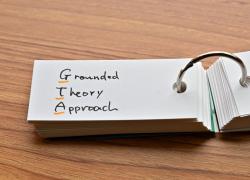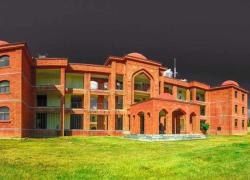Writing a theoretical framework for a PhD thesis: How important it is?
While presenting my PhD research proposal to the doctoral committee, one of the members asked, “gentleman everything is fine about your proposal but what is the theoretical or conceptual framework of your study”. I stood dumbfounded. I had absolutely no idea, till that very moment, what actually the theoretical or conceptual frameworks did stand for? I responded to the best of my understanding but truth be told, I was unable to convince him as I was not convinced myself, in the first place. This was the first major setback I received during my PhD journey and that literally flattened me.
If I had a rough idea of the critically important concepts of theoretical and conceptual frameworks at an early stage of the doctoral studies, I would have figured out the same and would have comfortably evaded the embarrassment. But it was not the case. The key lessons- on the bumpy road of PhD, one has to be mentally and emotionally prepared for such surprises. I was not. Besides, one cannot blame others for it. I had no other option but to blame myself for the failing.
This was a brief account of how I was introduced to the vitally important concepts of theoretical and conceptual frameworks during the course of my PhD studies.
Over the years, what I personally experienced, a vast majority of the PhD scholars and doctoral candidates face difficulties while conceptualizing and writing a strong theoretical or conceptual framework. In view of the fact, that there is very limited guidance available to the research scholars from the concerned supervisor or respective universities, in the less developed higher education systems of the world, this series of articles is aimed at providing some useful insight, guidance and professional support for the PhD scholars, academics and novice researchers about this sensitive scholastic area with a prime focus on how to write a solid theoretical or conceptual framework in qualitative and quantitative research.
These blog posts first of all explain what a theoretical framework is?. Discussion is concentrated on the significance of a theoretical or conceptual framework in PhD research studies. The elements of a theoretical framework, the types of the theoretical framework and the difference between theoretical and conceptual frameworks are also discussed in detail.
Some concrete examples of the theoretical and conceptual frameworks, challenges confronted by the scholars while making a theoretical framework and eventually what makes a strong theoretical framework, shall be the center of attention of these articles.
Finally, the most important points which need to be taken into consideration while writing a theoretical framework have been meticulously explained.
1.What is a theoretical framework?
A theoretical framework is a blueprint or guide or a map or a plan for a research activity that describes the concepts, models or specific theories, providing theoretical support for the research study. It is a structure that reinforces a theory of a scholarly research undertaking. It reflects the researcher’s synthesis of the literature, explaining a phenomenon. It delineates the actions required during the course of the study, given the existing knowledge postulated by other researchers and the personal reflections of the scholars.
Borrowed by the scholars for cementing groundwork for the research study, it is a model based on the existing theory in the related discipline or field of inquiry that is pertinent to the hypothesis of the study and serves as the cornerstone upon which the edifice of the research work is constructed. It helps not only to guide the researchers but to keep them confined to the accepted theories to make a subtle contribution to the body of knowledge.
It is a mental picture; the scholars believe can best germinate the natural progression of the phenomenon to be inquired. It is the scholar’s account of how a research problem would be investigated. It introduces an integrated way of looking at a problem under study. Describing the association between the main concepts of a study, it is arranged in a logical sequence to provide a visual image of how ideas in a research inquiry are connected to one another. By exhibiting the series of action the scholar intends to carry out in a research undertaking, it makes it a lot easier for the scholar to delineate and specify the concepts within the broad paradigm of the problem under study.
To be brief, it is the lens through which the scholar glances into his/her research world. This is a particular perspective to examine a research area, define a concept and explain a phenomenon. The theoretical or conceptual frameworks can either be a graphical representation of the phenomenon or in a narrative form or a blend of both showing key variables or constructs to be studied and the assumed relationships between them along with narration.
2. Importance of a theoretical framework in qualitative research
A theoretical framework is of the essence in qualitative research as it allows the scholar to conceptualize the study in a broader context of the field of knowledge. A robust theoretical framework lends the research study a sound scientific foundation. It demonstrates the researchers understanding of the depth of the existing knowledge in the area and allows the researchers to evaluate the guiding assumptions of the study.
The theoretical framework provides theoretical underpinnings for the research work. Working out the theoretical framework, grounded on the postulates and hypotheses evolved in other disciplinary contexts can both be enlightening. instrumental and effective, to be fully engrossed in the research theme. This not only enhances the empiricism and rigour of the research study but also gives credence to a research endeavour.
3. How to write a theoretical framework?
Being an essential building block, theoretical or conceptual frameworks are required to be developed by the research scholars. These are generative in nature, reflecting the thinking behind the entire research process. Generally, diagrams are developed to explicitly define the constructs and variables of the research study and their internal association are depicted by the use of arrows.
Here the research scholars are at complete liberty to follow an existing framework, modifying it to suit to the nature and context of the study. A well-developed framework must also be presented and elaborated in black and white to be understood comprehensively by the readers, superior and examiners. This connotes that once the scholar develops a diagrammatic representation of the main variables, he/she needs to further elaborate on the relationship among the underlying variable as well.
4. Difference between Conceptual and Theoretical Framework
In fact, the conceptualization and theoretical or conceptual frameworks are totally different concepts. The Conceptualization is the process involving conceiving, developing and clarifying concepts, whereas, a theoretical framework is a blueprint or guide or a map or a plan for a research activity that describes the concepts, models or specific theories, providing theoretical underpinnings for the research study.
To dig deeper, the conceptualization is the process of development and clarification of concepts whereas, a theoretical framework embraces concepts existing theories already used for a particular research study as theoretical support. The theoretical or conceptual framework must demonstrate an understanding of the relevant theories and concepts that are relevant to the research study and that relate to the broader areas of knowledge being debated about. In fact, the theoretical framework is supposed to be not something readily found within the body of scholarly literature. One must have to review pertinent research studies for theories that are pertinent to the research problem one is investigating. The selection of a theory should depend on its appropriateness, ease of application and most importantly explanatory power.
The term conceptualization is more an abstract term. It is the action or process of forming a concept or developing an idea of something. A theoretical framework or theoretical underpinnings instead is a robust body of knowledge that is employed by a research scholar in support of finding the answer, or answers to a research question.
5. How to make selection of a theoretical framework for a research study?
There is no distinct generally known and widely accepted theory for any doctoral research work, nevertheless, some theories stand relevant, make a lot of sense and hence draw a more favourable consideration, than the rest. The adoption of a theory needs to reflect the understanding of the researcher about the nature, purpose, rationale and significance of the research work and hence must drive the study.
The selection of a theoretical framework stipulates a deeper understanding of the research problem, its context, purpose, significance and research questions to be answered. It is crucial for the very reason that when the selection of a theory is undertaken in an unprofessional manner, it would be as if the researcher has set out on a wrong route or taken a wrong ride. The selected theoretical framework must substantiate the design and significance of the research study. To make an effective selection of a theoretical framework, the scholars must take into consideration the guiding principles of the study and position the problem in concert.
6. Important points need consideration while writing a theoretical framework for qualitative research
There are a number of points, considered thoughtfully shall enable the scholars and researchers to identify a suitable and strong theoretical framework for their research study. For instance, serious consideration of the discipline the theory is going to be applied to; agreement of the theory with the methodological analysis, looking for a well-developed theory with loads of constructs, having specific concepts and the guiding principles and focusing on the purpose and importance of the study being correlated with the theoretical framework. Apart from this, the theory must be used in concert with the research questions, inform the literature review, guide the data analysis and finally back the conclusions and recommendations.
Apart from this, it is worthwhile to understand the main concern for the inquiry into the research, ascertain key variables in the research, list the constructs and variables that might be relevant considerations, how the variables are related to the theory, consider the alternative theories, challenging the perspectives of the scholar and finally consider the limitations associated with the selected theory.
Conclusion
Theoretical or conceptual frameworks provide the philosophical, epistemological, methodological and analytical underpinnings of the research work. The PhD research scholars are expected to understand, select and expatiate theoretical or conceptual frameworks from the time the research proposal is initially conceptualized. Hence, the scholars’ choice of a theory, its constructs, rational and model must be clearly stated in the PhD research proposal and must duly be incorporated in the PhD thesis.
The blog post: Understanding the difference between theoretical and conceptual frameworks, discusses in detail the important elements of a theoretical framework, the types of a theoretical framework, the difference between theoretical and conceptual frameworks, examples of theoretical and conceptual frameworks, challenges confronted by the scholars while writing a theoretical framework and finally what makes a strong theoretical & conceptual framework.


















